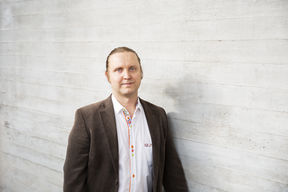Creating a unique professional profile by combining different fields of science

What kind of research do you do and why?
I work as an Associate Professor in the field of Thermodynamics of metallurgical processes, but my background is in geology and chemistry. During my whole career my main research themes have been inorganic melts at high temperatures – geological magmas and lavas, molten ash of pulp & paper and energy industries or molten slags, mattes or metals of metal industry.
I have concentrated on modelling chemical properties of melts and studying their effects on industrial processes – how the desired properties can be utilised and the harmful ones avoided. My aim is to improve the effectiveness and usability of boilers, smelters and chemical reactors, diminish the emissions of dangerous substances and recover useful elements economically.
How did you become a researcher?
Both my parents have been working in Åbo Akademi University, so university as an environment was familiar to me already as a child. When I graduated as a geologist I wanted to continue my studies in Norway, in University of Tromsø, where I had been as an exchange student. However, I began working as a research assistant in a laboratory of inorganic chemistry in Åbo Akademi, and as at the same time the professor of geology of University of Tromsø had an accident while hiking in arctic hills and sadly passed away, I decided to switch from geology to high temperature inorganic chemistry.
I was a little hesitant about my decision at first, but then I realised how much my knowledge in geology and mineralogy brought benefits to my career in chemistry and metallurgy. My profile is also quite unique because of my background.
What is the most important quality for a researcher?
A good researcher is naturally curious, persistent and a good communicator. He or she has to be able to communicate about the research not only to fellow researchers but to the whole society.
Already when I was as a schoolboy, almost everybody thought that I would become a researcher. But my field could be history as well. My sister works as a postdoctoral researcher in University of Tampere, and I have always been interested in world history as well.
What do you want your students to learn from you?
I hope my students learn that it is good to be interested in many different fields of science, which are not necessarily even close to each other. Often the most extraordinary combinations of subjects create unique profiles for future working life.
What are the highlights of your career and what do you expect from the future?
I have been lucky to have been able to work with internationally top research groups, which at the same time have had warm and friendly atmosphere. One highlight of my career was in 2010, when I had a chance to give a keynote speech in an international conference. Another one was when I received a post as an Academy of Finland Research Fellow. That gave me for the first time a possibility to gather my own research group and more freedom to do my research.
I wish I could for my part be able to develop my field of research in Finland. I would also like to find new interesting multidisciplinary research problems in a new academic environment.
Photo by Mortti Saarnia
Read more news
Soil Laboratory Exhibition – Exploring the Dialogue Between Human and the Earth in Utsjoki
Soil Laboratory explores the relationship between humans and the earth as a living landscape through ceramic practices in Utsjoki.
The Finnish Cultural Foundation awarded grants for science and art
A total of 15 individuals or groups from Aalto University received grants
Environmental Structure of the Year 2025 Award goes to Kalasatama-Pasila tramway
The award is given in recognition of meritorious design and implementation of the built environment. Experts from Aalto University developed sustainability solutions for the project.






